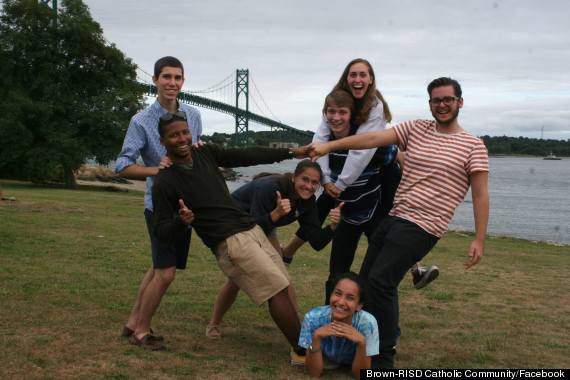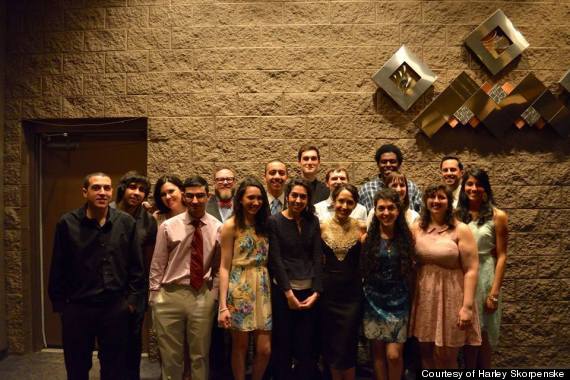Brandon Dale was approaching the end of his sophomore year of college when he received distressing news. His brother had been in a severe car accident and suffered a broken nose and “psychological damage.” With final exams just around the corner, Dale suddenly had a more troubling concern than grades to worry about.
“I received the news from my mother three weeks before finals, and I didn't really know how or where to begin processing,” Dale, a Class of 2017 Brown University student and member of the Brown-RISD Catholic Community, said. “I was angry. Sad. And mentally exhausted. So I did what I always do whenever I need to process: pray.”

Dale’s story is not unusual. Life does not stand still for young people during their college years -- family, relationships, health and countless other “real world” issues arise in their lives to compound the ever-present pressures of academic success. For many students, personal spirituality and religious groups provide necessary support to guide them through this challenging time.
Millennials may question their faith, but that doesn’t keep them from finding time to pray. According to a study by the Integrated Innovation Institute at Carnegie Mellon University, 62 percent of U.S. adults aged 18-34 say they talk to God.
Engie Salama, a senior studying Global Health and Spanish at the University of Southern California, had a rude awakening during her freshman year when she failed an exam for the first time. At the time she was also struggling to maintain a prayer routine and decided to tackle both issues in one.
“The discipline required to pray is the type of discipline needed to study daily, so I endeavored to review one biology lecture after every prayer,” Salama said. “Praying helped balance out the stress and negative emotions I felt about the class and helped me overcome the mental block coloring my prior failure.”
Prayer and meditation are often happen within community, and students often look for campus groups for support and to help them develop and express their faith.
“Religious and spiritual clubs on campus are sources of solace, support and solidarity that help students navigate through their undergraduate years,” Varun Soni, the Dean of Religious Life at the University of Southern California, told HuffPost.
Kevin Shen, who graduated from Yale University in 2011 and identifies as “agnostic with Christian and Buddhist influences," spent his last two years of college heavily involved with Indigo Blue, the school’s former Buddhist chaplaincy. It became like a second home.
“Bruce, the Buddhist chaplain, and the space he cultivated at Indigo Blue became an integral parts of my life and personal development,” Shen said.
Some colleges also have interfaith groups which bring students of many faiths and backgrounds together. These groups can offer a spiritual alternative to traditional faith groups, though many students participate in their own religious communities as well.
Salama has served as the president for both the USC Muslim Student Union and the Interfaith Council at University of Southern California. She knew before entering college that she wanted to participate in the MSU, but her involvement with the Interfaith Council developed more spontaneously when a friend brought her to a meeting.
![Engie Salama (center) with friends at the USC Interfaith Block party.“I recognized a need for interfaith involvement because of misconceptions about Muslims and Islam,” Salama told HuffPost, “I felt empowered in the safe space of iFaith to share my faith with others.”Religious students, like their secular peers, balance many competing responsibilities."Many of my conversations with students begin as discussions about school and work possibilities, but they quickly move in an existential direction."“It’s incredible how busy college is and how easy it is to become overwhelmed and stressed to the point of losing one’s priorities,” Ana Alejandre-Lara, a Class of 2017 student studying Cognitive Neuroscience at Brown University, told HuffPost. “My spirituality allows me to keep these things in check.”Salama agreed that taking moments to reflect on her faith provides space for her to see the bigger picture beyond an immediate desire to succeed.“Stepping out of my busy lifestyle to take a few minutes to worship God is an amazing way to manage stress. It encourages me to step back and recognize that despite all my worldly concerns -- including succeeding academically, preparing for a future career, and working -- there is a greater power that I turn to for support.”Brandon Dale enjoys an outing with the Brown-RISD Catholic Community.The Social Science Research Council (SSRC) released a report in 2007 on “Religious Engagement Among American Undergraduates.” Among the findings was a suggestion that religious students are less likely to participate in drugs, drinking and partying -- which in itself might induce stress for students at a time when social groups are of upmost importance.Harley Skorpenske, a third year zoology student at Ohio State University who converted to the Baha’i faith when she was fifteen, follows strict religious requirements but derives confidence from her faith to be who she is without fearing social repercussions.“My faith requires daily prayer, no gossiping, the observance of holy days and a period of fasting. It prohibits extramarital sex, gambling and the non-medical use of alcohol and drugs. [But] I greatly enjoy attending parties and other typical college student social gatherings. My heart is committed to my faith and therefore maintaining these standards is really no challenge.”As Dean of Religious Life, Soni’s job often makes him privy to students’ innermost dilemmas of faith and identity.“Many of my conversations with students begin as discussions about school and work, but they quickly move in an existential direction,” Soni told HuffPost."I felt empowered in that safe space to share my faith with others."“There are a number of resources on campus that help students figure out how to secure graduate school admission or a job," Soni said. "A unique contribution from an Office of Religious Life is to challenge students as to why they want to go to graduate school or work in a particular field.”For Ze’ev Lowenberg, a senior at West Virginia University, his desired career path stems from a deep identification with his religion.“I am constantly in the Hillel and Jewish state of mind,” Lowenberg told HuffPost. “It is the most essential part of who I am, and it follows me everywhere.”Lowenberg is a senior cadet in the ROTC and is applying to Rabbinical School to be a rabbi in the Air Force. He has experienced not only the stress of school but also the pressures of high-intensity field training for the Armed Forces.“Being spiritual and being grounded in my faith helps push me through the most trying times,” Lowenberg said. “I am a true believer in ‘Everything happens for a reason,’ and that helps me get back up after being knocked down.”College students may find themselves “knocked down” in various ways throughout their education, but for Harley Skorpenske that became a literal reality one day.Harley Skorpenske (third from the left, front row) poses with the Baha'i Campus Association.When she was 16 years old Skorpenske was diagnosed with systemic lupus, which made college a difficult prospect, she said. One particularly cold January day during her freshman year, Skorpenske fell down while walking between classes. She went to sit on a heater inside the building and watched as her joints filled with fluid.“I had every intention to call my mom that night and tell her I was done. I was convinced that my body was not strong enough to finish this. Before I went home, I went to the weekly Baha’i devotional. We talked about the faith’s emphasis on education and went over selected writings. Over the next week I reflected on this devotional and decided to push on. I am now going into my third year here and am very pleased with that decision.”.articleBody div.feature-section, .entry div.feature-section{width:55%;margin-left:auto;margin-right:auto;} .articleBody span.feature-dropcap, .entry span.feature-dropcap{float:left;font-size:72px;line-height:59px;padding-top:4px;padding-right:8px;padding-left:3px;} div.feature-caption{font-size:90%;margin-top:0px;} .articleBody span.feature-name, .entry span.feature-name{float:center;font-size:30px;}](https://img.huffingtonpost.com/asset/5e987b592500008d216b7e7b.jpeg?ops=scalefit_1280_noupscale)
 Brandon Dale enjoys an outing with the Brown-RISD Catholic Community.
Brandon Dale enjoys an outing with the Brown-RISD Catholic Community.“My faith requires daily prayer, no gossiping, the observance of holy days and a period of fasting. It prohibits extramarital sex, gambling and the non-medical use of alcohol and drugs. [But] I greatly enjoy attending parties and other typical college student social gatherings. My heart is committed to my faith and therefore maintaining these standards is really no challenge.”As Dean of Religious Life, Soni’s job often makes him privy to students’ innermost dilemmas of faith and identity.“Many of my conversations with students begin as discussions about school and work, but they quickly move in an existential direction,” Soni told HuffPost."I felt empowered in that safe space to share my faith with others."“There are a number of resources on campus that help students figure out how to secure graduate school admission or a job," Soni said. "A unique contribution from an Office of Religious Life is to challenge students as to why they want to go to graduate school or work in a particular field.”For Ze’ev Lowenberg, a senior at West Virginia University, his desired career path stems from a deep identification with his religion.“I am constantly in the Hillel and Jewish state of mind,” Lowenberg told HuffPost. “It is the most essential part of who I am, and it follows me everywhere.”Lowenberg is a senior cadet in the ROTC and is applying to Rabbinical School to be a rabbi in the Air Force. He has experienced not only the stress of school but also the pressures of high-intensity field training for the Armed Forces.“Being spiritual and being grounded in my faith helps push me through the most trying times,” Lowenberg said. “I am a true believer in ‘Everything happens for a reason,’ and that helps me get back up after being knocked down.”College students may find themselves “knocked down” in various ways throughout their education, but for Harley Skorpenske that became a literal reality one day.
 Harley Skorpenske (third from the left, front row) poses with the Baha'i Campus Association.
Harley Skorpenske (third from the left, front row) poses with the Baha'i Campus Association.